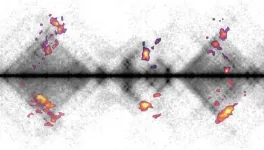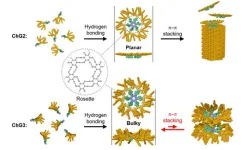(Press-News.org) COLUMBUS, Ohio – Taking anti-obesity drugs has led some U.S. adults to throw away more food than they tossed before starting the medications, a new study has found.
In a survey of people currently on GLP-1 medications such as Ozempic, 25% of respondents agreed they had wasted more food since taking the drugs, compared to 61% who disagreed. People who were nauseated by the drugs were more likely to report increased food waste. Being on the medications for a longer period of time and eating more vegetables were associated with less food waste.
Scientists at The Ohio State University see this study of consumer behavior as an initial effort to consider the effects of these increasingly popular anti-obesity drugs on food production and waste nationally and globally.
“This was a pilot study to start looking at implications of these medications and get in the ballpark of understanding which broad categories of food are more or less preferred after starting the medication,” said senior author Brian Roe, professor in the Department of Agricultural, Environmental and Development Economics at The Ohio State University.
“The fact that food waste appears to decrease as patients acclimate to the medication suggests there may be a fairly simple remedy – advising patients new to these medications about the possibility of discarding food as their diets change, which could reduce food waste and lower their spending.”
The research was published recently in the journal Nutrients.
About one-third of food in the United States is wasted, and about half of that is attributable to consumers who waste an average of 1 pound of food per person per day, according to National Academies estimates.
As of spring of this year, 6% of U.S. adults reported taking GLP-1 agonists, which treat type 2 diabetes and obesity by acting on a hormone in the small intestine to lower blood sugar, slow emptying of the stomach and signal fullness to the brain. In the study, almost 70% of respondents were taking semaglutide (Ozempic, Rybelsus, Wegovy) and nearly a quarter were taking terzepatide (Mounjaro).
The researchers surveyed 505 U.S. adults currently on anti-obesity medications through an online questionnaire focused on sociodemographic factors, personal characteristics, and questions concerning changes in eating habits, weight and food waste since starting on the medications. The data analysis looked for various influences on how much participants agreed with one key statement: “Since beginning this medication I have found I waste more of the food that I purchase.”
Participants represented a range of ages, household incomes and education levels, and most had insurance. On average, the group had lost 20% of their body weight if they had been on the medications for at least one year.
The one-fourth of participants who had been on the drugs for a year or longer were less likely to report wasting food than people who had taken the medication for 90 days or fewer – about 30% of the respondents.
Though nausea was the main driver of food waste, the results hinted at another possible influence: changes in preferences and habits that led people to toss foods that had fallen out of favor. Overall, participants reported adding produce, protein, fish and healthy fats to their diets and consuming less alcohol, pasta and other carbohydrates, fried foods, sweets and dairy.
“Meat is neutral in terms of eating more or less after starting this medication,” Roe said.
The addition of vegetables to the diet – the most commonly wasted food group in the United States – was linked to a lower likelihood of wasting food, another sign of changing habits that, in this case, involved eating more veggie-dense meals.
Roe is planning another paper examining changes to household finances linked to taking anti-obesity medicines – in terms of both pharmacy and food costs. Given the steady rise in GLP-1 agonist prescribing, there are broad local and global economic and environmental impacts at play, he said.
“People taking these medications in all likelihood will be spending less on food, but whether there is a chance to offset the cost of the drug through reduction in food spending remains to be seen,” he said.
Other research labs have used simulations to show that reducing population-level food consumption can lower energy costs, preserve land and water resources, and reduce greenhouse gas creation by keeping discarded food out of landfills. But considering how relatively new anti-obesity medications are, there isn’t enough data to make predictions about the extent of their societal effects just yet.
“I think it’s clear that novel anti-obesity medications have a chance to impact global public health, and research suggests changes in intake of food can affect indicators of environmental impacts,” Roe said. “There are lots of compelling questions as we think about sustainability of the food system and health care.”
First author Jamil Mansouri, a Purdue University agricultural economics student, completed this work as a summer intern at Ohio State as part of the Big Ten Academic Alliance Summer Research Opportunities Program.
This research was supported by the USDA National Institute of Food and Agriculture and Ohio State’s Van Buren Fund, which supports the professorship held by Roe in the College of Food, Agricultural, and Environmental Sciences.
#
Contact: Brian Roe, Roe.30@osu.edu
Written by Emily Caldwell, Caldwell.151@osu.edu; 614-292-8152
END
University of Virginia School of Medicine researchers have discovered how long-term treatment of high blood pressure with commonly prescribed drugs can destroy the kidney’s ability to filter and purify blood. The finding could open the door to better ways to manage high blood pressure and other vascular diseases.
The class of drugs, known as renin–angiotensin system (RAS) inhibitors, block the effects of the renin enzyme, relaxing blood vessels and allowing blood to flow more easily. They are widely used as first-line medications for hypertension (high blood pressure). But long-term use can take a terrible toll on the ...
NEW YORK, NY, NOV. 21, 2024—A surgical team at NYU Langone Health has performed the first fully robotic double lung transplant in the world. The procedure marks a breakthrough in the potential of robotic surgery and minimally invasive patient care, making NYU Langone the new leader in robotic transplant surgery around the globe.
Stephanie H. Chang, MD, associate professor in the Department of Cardiothoracic Surgery at NYU Grossman School of Medicine and surgical director of the Lung Transplant Program ...
DARIEN, IL – The Associated Professional Sleep Societies is accepting research abstracts and session proposal submissions for SLEEP 2025, the 39th annual meeting of the APSS, which will be held June 8 to 11 at the Seattle Convention Center.
Research abstracts will be accepted for oral and poster presentations. Hot topics for 2025 include machine learning and artificial intelligence, metabolomics and genomics, sleep and the glymphatic system, orexin pharmacology, and obesity management. Accepted abstracts ...
New research from the Kind Group at the Hubrecht Institute sheds light on how cells repair damaged DNA. For the first time, the team has mapped the activity of repair proteins in individual human cells. The study demonstrates how these proteins collaborate in so-called "hubs" to repair DNA damage. This knowledge offers opportunities to improve cancer therapies and other treatments where DNA repair is essential. The researchers published their findings in Nature Communications on November 21.
DNA is the molecule that carries our genetic information. It can be damaged by normal cellular processes as well as external factors such as UV radiation ...
“For the first time, we have succeeded in taking a zoomed-in image of a dying star in a galaxy outside our own Milky Way,” says Keiichi Ohnaka, an astrophysicist from Universidad Andrés Bello in Chile. Located a staggering 160 000 light-years from us, the star WOH G64 was imaged thanks to the impressive sharpness offered by the European Southern Observatory’s Very Large Telescope Interferometer (ESO’s VLTI). The new observations reveal a star puffing out gas and dust, in the last stages before it becomes a supernova.
“We discovered an ...
COLUMBUS, Ohio – In a polarized nation, there is one thing that nearly all Americans agree on, according to a recent study: Sports are good for us.
Researchers from The Ohio State University and Ithaca College found that more than 9 out of 10 Americans agreed that sports build character and improved one’s health, while 84% agreed playing sports makes one popular in school and 85% said it makes one more well-known in the community.
According to 67% of those surveyed, playing sports even leads to better grades in school.
While these beliefs may seem harmless, ...
Researchers often look to photosynthesis—a process that turns sunlight into chemical energy in plants and bacteria—as a model for innovation. Photosynthesis is in turn linked to chlorophyll pigments, tiny green molecules that play a key role in harvesting light. Naturally, these chlorophyll molecules are organized into precise structures to optimize light absorption in plants and bacteria, and efficiently capture sunlight for energy. Inspired by this natural structure, scientists have explored ways to synthetically assemble chlorophyll-based ...
Rutgers researchers at the Brain Health Institute (BHI) and Center for Advanced Human Brain Imaging Research (CAHBIR) have uncovered how different types of brain cells work together to form large-scale functional networks in the human brain – interconnected systems that support everything from sensory processing to complex decision-making – paving the way for new insights into brain health and disease.
By pinpointing these cellular foundations, the study, published in Nature Neuroscience, offers a deeper understanding of the cellular foundations of cognition and mental health.
The brain’s functional properties arise from the varied ...
A potentially life-changing heart condition, dilated cardiomyopathy, can be caused by the cumulative influence of hundreds or thousands of genes and not just by a single “aberrant” genetic variant, as was previously thought, finds a new study led by researchers at UCL (University College London), Imperial College London and the MRC Laboratory of Medical Sciences.
Dilated cardiomyopathy (DCM) is a condition in which the heart becomes progressively enlarged and weakened, reducing its ability to pump blood efficiently. It is estimated to affect up to 260,000 people in the UK (one in every 250 individuals) and is the leading cause of heart transplantation.
Previously, ...
People with poorer mental health are more prone to browsing negative content online, which further exacerbates their symptoms, finds a study led by UCL researchers.
The relationship between mental health and web-browsing is causal and bi-directional, according to the Wellcome-funded study published in Nature Human Behaviour.
The researchers have developed a plug-in tool* that adds ‘content labels’ to webpages—similar to nutrition labels on food—designed to help users make healthier and more informed decisions about the ...



